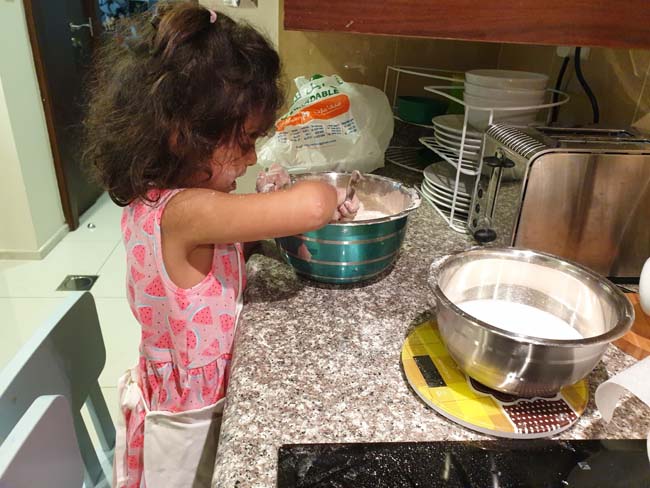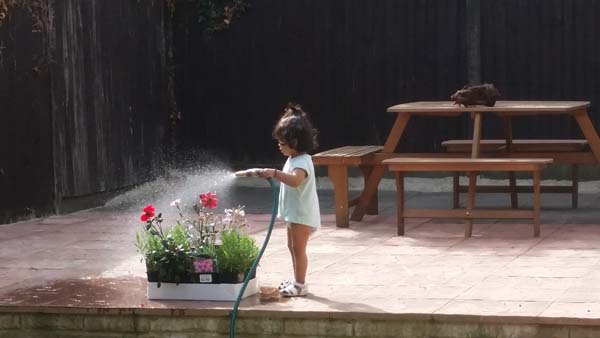The importance of structured learning during childhood through schooling is undeniable. However, the skills children learn at home are some of the most valuable ones they can gain that will remain with them throughout their lives. An enriching family life packed with unique experiences can significantly enhance a child’s school learning abilities. It can also prepare them to gain problem-solving skills and deal with real-world situations from an early age.

So if you are wondering how you can turn your daily home life into an educational experience, here are some suggestions to get started.
Encourage Decision Making
Making decisions is a life skill children can begin learning at a young age. You can start small by allowing them to make simple choices such as choosing which colour socks they wish to wear.
As they start school, they will learn about the rewards of good decisions and the consequences of bad ones. For example, you may give your child the responsibility of getting their school bag ready. If they forget their hat, the natural consequence could be that they will not be allowed to play with their friends outside on hotter days.
Sometimes it may be difficult to witness your child making a poor decision and experience the results of their actions. However, allowing them to experience consequences gives them the necessary knowledge, understanding, and motivation to do things differently next time. Therefore, if it is safe, try to step back sometimes and let your child learn from their missteps. This approach will foster intrinsic motivation, which helps them to build inner willpower that will benefit them in the future. It helps develop a sense of autonomy, making them more independent and self-assured. It also teaches them the concept of cause and effect, which allows them to make predictions and understand their ability to impact their environment. This approach cultivates resilience by teaching them how to deal with adverse experiences. Throughout this process, your is to help them work on their coping and problem-solving skills.
Introduce Money Management
Children learn basic maths at a young age, including counting, but you can expand on that by teaching them how to deal with money. Showing your children how to spend wisely and save will lay the foundations for managing their finances when they receive their first paycheck.
You can get them to manage their allowance and save for things they want, teaching them to budget and delay gratification. While doing this, you can also introduce them to the concept of donating to charity and saving up to do that. As children need to understand that basic household chores are every family member’s responsibility, it is best to avoid giving them allowances for simple tasks. However, you can with more challenging ones like washing the car.
Shopping trips can also be an excellent opportunity for teaching money management. It can indeed feel like there is no end to children’s demands in shops, and sometimes, you will give in to that pressure. However, you can also use some of those instances to show them how to search for their desired items at different shops or sites and compare prices. This will teach them to think flexibly.
Collaborate on Care Tasks
Do not miss the opportunity to teach your child how to care for their home by keeping it clean. They will need this skill for when they move out and have a space of their own to manage, and it also teaches them about self-care and family life.

Doing regular chores like cleaning helps them develop a strong sense of self-confidence and understanding of teamwork. It also hones their organisational skills and teaches them how to be responsible.
Additionally, a study by Marty Rossmann, an emeritus associate professor of family education at the University of Minnesota, supports this. His research shows that young adults who began chores at age three or four were more likely to succeed in many ways. They were more likely to be self-sufficient, have good relationships, and achieve academic and early career success than those who started as adolescents or didn’t have them. Another study from the Harvard Graduate School of Education found that daily chores teach children to be empathetic and responsive to others’ needs.
Chores should be age appropriate. For instance, younger toddlers can put away their toys at the end of the day and put their dirty clothes in the laundry basket. When they are four or five, you can ask them to make their beds, wipe tables and surfaces, and dust furniture.
Young children are often very keen to learn and help, so encourage them and let them be involved. They may not do it perfectly and may make a complete mess, but you can still learn to praise their efforts and celebrate small wins.
You can also try assigning chores based on your child’s interest to increase motivation. For tasks they may not enjoy, try coupling the activity with something fun, like getting them to dance since they are already on the move!
Doing laundry is another essential life skill children can learn early. Toddlers can start by learning how to organise clothes by colour. As they get older, they can move on to interpreting labels and organising clothes based on instructions. You can teach your children about various detergents (including their impact on the planet!) and how to measure the required amount and apply the correct settings before turning on the machine. You can also assign them the task of drying the clothes after you’ve washed them and getting them to fold and sort them in piles before putting them away. This process will help develop their time management and organisation skills.
Team-up at Mealtime
You can ease your child into meal planning and prepping from a young age by allowing them to prepare their lunch box.
If your child enjoys writing, ask them to write a recipe and prepare the meal together. They will learn to think methodically and understand the importance of attention to detail if, for instance, they notice an instruction is missing. Or, they can join in by writing the shopping list, helping you buy ingredients, weighing and learning about units of measurement, following instructions, and doing the actual cooking. These tasks are creative ways for kids to use their mathematical, organisational, and time-keeping skills. If you are expecting guests, your child can suggest a theme or specific cuisine, prepare the menu, set the table, and prepare some games to play together. This will motivate them to get more involved in family events while they learn to host and develop their communication skills.
Get Fixing as a Family
Getting your child involved in fixing things in your home will significantly develop their problem-solving and critical thinking skills. They can start by doing something as simple as repairing one of their toys. This task will also increase their appreciation for their possessions. If your children are older, you can involve them with minor household repairs, like changing lightbulbs.
Foster a Love for the Planet
If you have a home garden, it is a great learning tool, regardless of its size. Getting your children involved in caring for plants, nurturing flower beds, and tending to vegetables teaches them responsibility. The next time you plant new seeds, give them one or two plants to manage, depending on their age. You can also learn how to make compost together. These activities will help them understand the Earth’s incredible life-giving properties and prepare them to think sustainably for the future.
You can expand your child’s sustainability awareness by taking them to the recycling points and reading or watching a documentary together on how they help the planet. They can apply this knowledge by making separate recycling bins using old cardboard boxes and getting them to label each one.
You can also go through old clothes, books, and toys together and set unwanted ones aside to donate to charity or directly to families in need. When you travel, you can also pack those and donate them. This will be a meaningful experience for your child that will help them develop compassion and kindness and expand their sense of humanity towards others.
Expand on Experiences
Local clubs and events can be wonderful resources for children to learn about other backgrounds and cultures. They are a chance to learn about different cuisines, rituals, and customs and talk about how they differ from your practices.
Attend museum exhibitions and historical sites and discuss them with your child. You can even get them to create something at home based on their trip.
Plan family camping and day trips with your child, and get them involved with the organising. Overnight trips help develop their survival skills by teaching them to resolve problems that may arise in the wild with minimal resources. These experiences are also a profound way for your child to learn to value and be grateful for all they have. They can also be a starting point that gets them curious about the local environment and wildlife, which you can support by giving them books on the subject.
Indulge Imaginations
Your child’s ability to get creative and use their imagination is vast, and you can support it in many ways. For example, you can help them transform your home into an exotic destination like Bali. Indulge their artistic talents by encouraging them to create models of landmarks with cardboard and mimic the grass and sea with rugs and blankets. Play sounds and display images to immerse them in Bali’s scenery. You can even get them to harness their culinary skills by preparing fresh juice cocktails. These activities will enable them to think outside the box and give them open channels to run away with their inner creativity.
Children are born with a natural curiosity that prepares them to learn in various ways. You can make the best of it by keeping activities and opportunities consistent. Soon, you will see them expand with everything they have learnt and pick up skills they will retain until they become well-rounded adults.



